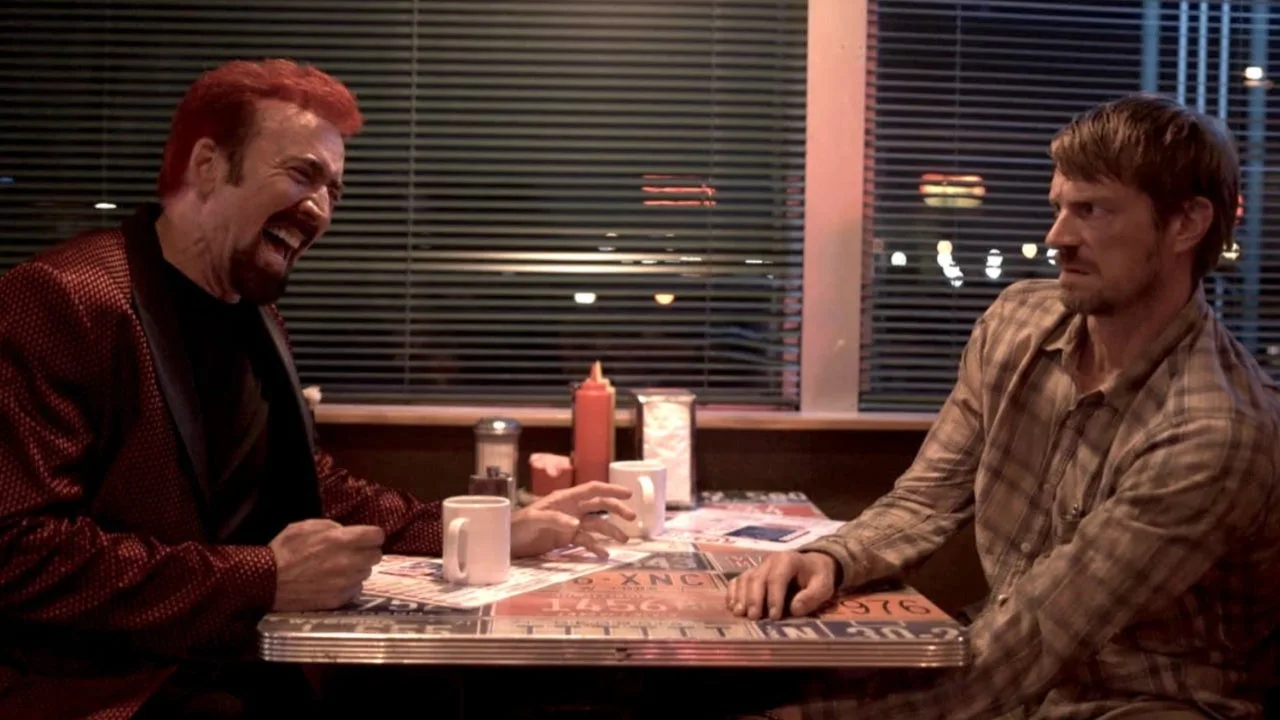Sympathy for the Devil Review
Sympathy for the Devil premieres in theaters July 28
Realism’s stranglehold on film acting has conditioned American moviegoers to to reject stylized performances as inherently laughable. This becomes a particular issue when discussing the work of Nicolas Cage, whose ironic popularity over the past decade revolves around the concept of “Cage rage”: those moments when the Oscar winner pushes himself to extremes on camera. And yes, if the tone of the portrayal doesn’t match the tone of the film, that can get silly. But if you get out of Cage’s way, he’ll take you where you need to go. Sympathy for the Devil understands this.
The title makes it sound like a horror movie, and Cage’s costuming – his hair is dyed red and black, and he wears a suit jacket to match – suggests an Angel Heart/“Louis Cyphere” (say the name out loud) type of situation. And the film does tease the potential for supernatural elements throughout its quick 90-minute runtime. But, for the most part, this is a crime thriller, driven by monologues, mistaken identity, and a soundtrack of vintage soul tracks that fit the mood and make for pleasant travel companions.
Joel Kinnaman co-stars as “The Driver,” an ordinary schmuck who, as the story begins, is driving down the Las Vegas Strip on his way to the hospital where his (unnamed) wife is in labor with their second child. The Driver pulls into the hospital parking garage, parks, and is rooting through his hospital bag when a mystery man – played by Cage and referred to in the credits as “The Passenger” – forces his way into the backseat and pulls a gun. “Drive,” he says.
The Driver begs The Passenger to spare him: He’s a family man, please just let him go back to the hospital, it’s an emergency, etc. The Passenger doesn’t care. They keep going, out of the city and into the desert. From there, most of the film is a two-hander that takes place inside the confines of The Driver’s car. Kinnaman, best known for his roles on The Killing and Altered Carbon as well as in the Suicide Squad movies, holds his own. But a good bit of his role involves looking nervously in the rearview mirror as Cage monologues in the back seat – which is perfect.
Cage must have been taken with writer Luke Paradise’s script; he’s listed as a producer in the credits (which isn’t always the case for the actor’s prolific output), and this is Paradise’s first screenplay to actually get made. And Cage sells his lines with gusto, tormenting Kinnaman with his paranoiac ravings. A few miles into their drive, The Passenger starts needling The Driver to tell him who he really is, which adds a layer of intrigue: Is The Passenger misinformed, or is The Driver hiding something? Eventually, they pull into a roadside diner, where the tension explodes in bloody, fiery Tarantino-esque fashion.
The way that the conflict between The Driver and The Passenger plays out is pure crime cliché. And the story starts to lose momentum once The Driver’s true intentions are revealed. But the journey to get there is compelling, thanks to Cage’s performance.
If you get out of Cage’s way, he’ll take you where you need to go.
The Passenger is a manic, possibly psychotic career criminal with a Boston accent who likes to wave his gun around with the safety off, and Cage plays all of his tics to the rafters. He takes the audience on a roller-coaster ride, careening from weepy despair to anger so intense his eyeballs bulge out of their sockets. But there’s an honest wild-card danger to the portrayal as well: A scene where Cage dances to “I Love the Nightlife (Disco ’Round)” brushes up against camp, but shifts back to menace before the snickering really settles.
Everything else about Sympathy for the Devil is professional, but unexceptional. The color grading is your standard digital orange and blue, and the cinematography is unobtrusive save for a handful of slo-mo shots that stick out in a negative way. And the effects and overall production value are impressive, given the film’s presumably modest budget. This is a team that knows how to allocate its resources wisely – which includes letting Nicolas Cage do his thing.











Post Comment